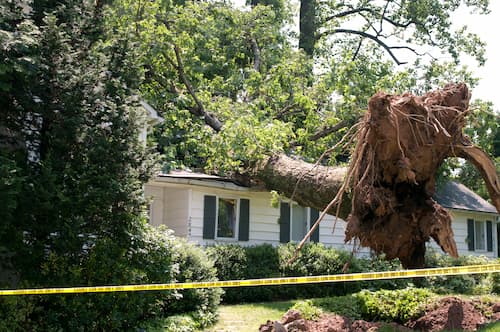How to file a tornado claim
After a tornado, make sure everyone is safe. Call emergency services if necessary; if there are injuries, downed power lines or other dangerous conditions. Then, you can take the next steps to deal with damage.
- Call your homeowners insurance company as soon as possible to file a claim. After a tornado or other natural disaster, insurance companies will be inundated with phone calls. It’s best to get the ball rolling as quickly as possible. Robin Olson, Senior Research Analyst at the International Risk Management Institute(IRMI), suggests starting a claims log at this point. Document dates and names of people you speak to in case of issues or delays with your claim.
- Prevent further damage. Your home insurance requires that, if it’s safe, you should take the necessary steps to prevent further damage to your home. For example, putting up tarps or boarding up windows to prevent rain or pests from getting in.
- Take pictures and videos. Walk around your property and take photos and videos from different angles to document the damage.
- Gather receipts and serial numbers of damaged items if you have them. This can be difficult after a tornado, because things are a mess and your belongings might be destroyed. Some people find it helpful to have a waterproof box with a list and serial numbers of appliances and other items around your home in case of an emergency.
- Make temporary repairs if your claims adjuster says it’s OK. You may want to hold off on doing too much until a professional gets involved.
- Cooperate with the claims adjuster. Provide any required documentation and answer any questions to ensure things go quickly and smoothly. Meet every deadline.
- Hire contractors and get repair estimates. From there you will submit the estimates to your insurance carrier so the work can commence.
If you can’t stay in your home because the damage is too extensive, the additional living expenses (ALE) portion of your home insurance will cover a hotel. Keep all receipts for lodging and even food, and submit those to your insurance carrier for reimbursement.
In the meantime, read your policy documents to check out all your deductibles and policy limits. Most companies provide online access to these documents.
How long do you have to make an insurance claim after a tornado?
“The sooner the better; it doesn’t have to be immediate but should be timely,” says Matt Banaszynski, CEO of the Independent Insurance Agents of Wisconsin.
Your insurance carrier will guide you through the steps once you file your claim. Depending on your carrier and the state you’re in, you will be expected to show proof of loss, generally within 60 days. The insurance adjuster assigned to your case will notify you of all deadlines related to your claim and you should meet all of them.
Because of the backlog of claims when a natural disaster occurs, it might take a long time for your claim to be paid in full. It’s in your best interest, however, to start the claims process and provide all the documentation asked of you as soon as possible rather than waiting.
There is a statute of limitations on filing a property damage claim; it varies by state but is usually two years.
How long does a tornado damage insurance claim take?
The length of time it takes for your claim to be settled will vary. It’ll depend on the severity of the damage and a few other factors, including state laws and how many other claims are being processed in your area after a disaster.
It could take weeks or even months for your claim to be settled. Remember, not only will you have to submit documents and claims paperwork, but an adjuster will have to visit your home to assess the damage. Then you’ll have to get repair estimates and start work. The final cost of the repairs won’t be known until everything is complete.
Generally, you’ll get an initial check to pay deposits to your contractors, and then another check when work is complete. Depending on the severity of the damage, that could take a long time. Be patient and stay in touch with your adjuster and the contractors working on your home.







